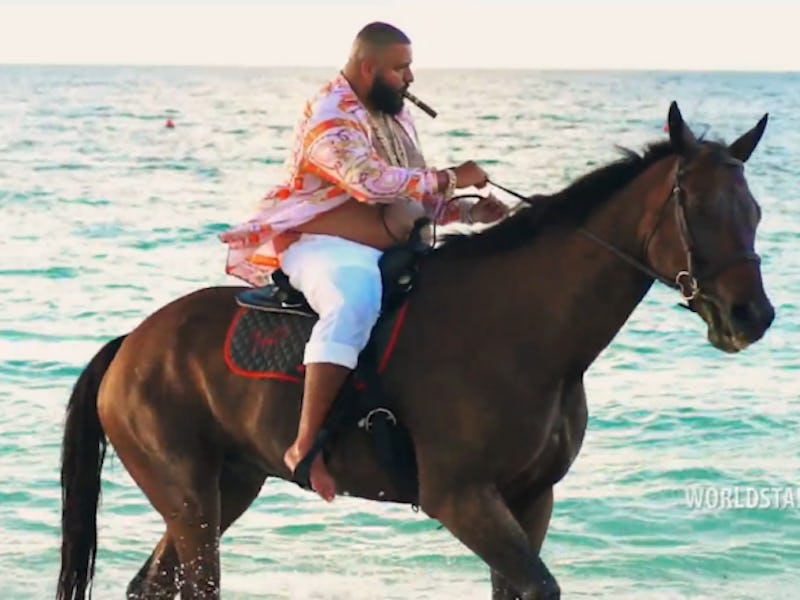Why DJ Khaled's West Indies Tribute In "Nas Album Done" Is Badass
They don't want you to rep your culture.

DJ Khaled released his new video for his song, “Nas Album Done”, off his critically-acclaimed album, Major Key. The video is visually stunning, and might be his best to date. Khaled rides a horse through the ocean, walks around with his shirt off, and gets into long diatribes with Louie Rankin in an epic nine-minute video. However, the best part of the video is the West Indian culture to which DJ Khaled pays tribute.
The video was shot in the Bahamas, and features dancehall artist/actor Louie Rankin, who was in Shottas with DJ Khaled and Belly with Nas. DJ Khaled hilariously attempts to speak Jamaican patois, something that he often does in his everyday conversation and videos on Snapchat. The girls in the video are dressed in Caribbean carnival attire, playing mas and whining to the music. Surprisingly and most importantly, DJ Khaled does not end the video by playing a dancehall record or a reggae tune, which one would expect because Jamaican culture is what most people think of when people speak about the West Indies. Khaled plays “Vagabond”, a soca song by Antiguan born artist, Ricardo Drue.
Of late, we have seen dancehall have a resurgence in popular culture – with many pop artists using elements of dancehall music to create their songs. However, artists like Justin Bieber and more recently, Drake, have taken a lot of heat for using dancehall without giving recognition to the roots of the music. Two of Drake’s most popular songs, “Controlla” and “One Dance”, on his latest album, Views from the 6, is basically Drake trying to speak patois over a Caribbean riddim (as it would be called in the West Indies). In a recent interview with The Guardian, dancehall artist Sean Paul, when asked about the use of dancehall music in pop culture today, stated:
It is a sore point when people like Drake or Bieber or other artists come and do dancehall-orientated music but don’t credit where dancehall came from and they don’t necessarily understand it. A lot of people get upset, they get sour. And I know artists back in Jamaica that don’t like Major Lazer because they think they do the same thing that Drake and Kanye did – they take and take and don’t credit.
Credit is important for Caribbean artists because many of them are stifled from traveling abroad because they are unable to get a Visa – since many have criminal records. For example, popular dancehall artist and friend of Drake, Popcaan, has had trouble traveling to America because of marijuana offenses on his record. Because the authentic, Caribbean sound is unable to spread, pop artists can use the sound and get away with it because American audiences are not familiar with the origins. There is also a huge problem of whitewashing the music as some magazines, like, Rolling Stone have done – referring to it as tropical house music.
It is also dangerous because Americans don’t do too well when it comes to learning about other cultures. Many still refer to Rihanna’s whining as twerking, think that appropriating Rastafarian culture is an okay thing to do, and feel that dreadlocks are dirty. When artists use the fun vibes of Caribbean music without giving credit where credit is due, it does not open up the possibility of teaching and dispelling negative beliefs. It seems exploitative because it comes across as having no interest in expanding our cultural knowledge.
In one swoop, DJ Khaled helped broaden people’s knowledge of the entire West Indies. We like to make fun of DJ Khaled, but he has always had his foot on the throat of culture. He is able to cross cultures easily and I salute him for what he has done so far. As a first-generation Trinidadian-American, I did not think that I would see Caribbean culture as widespread as it is now. Continue to keep the good vibes going, but bring awareness to the islands. Stop cultural ignorance one song at a time.